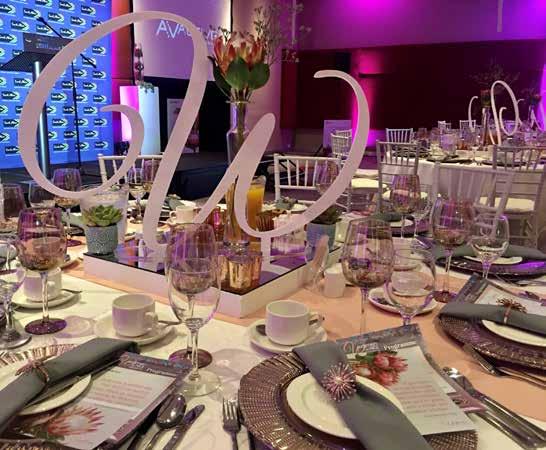
23 minute read
Cape Crusader From the Northern and Eastern to the Western
CAPE CRUSADER
Augrabies Falls
Advertisement
From the Northern and Eastern to the Western Cape, Meetings goes on an exciting expedition to unearth some of the best things to see and do when conferencing in the region.

Flamingo Casino

Tswalu Game Reserve
NORTHERN CAPE
Where to meet…
Sun International’s Flamingo Casino offers an affordable and versatile space for conferencing in the Northern Cape. It has a selection of adaptable meeting rooms with state-of-the-art equipment for hire, and ample accommodation. The complex has a range of restaurants to choose from as well as team-building activities and a 24-hour casino to keep guests entertained. Its largest conference venue can seat 240 pax and is suitable for private corporate functions and business meetings.
What to see…
The Northern Cape is more commonly known as a vast arid region, but it is home to some of the most amazing natural wonders in the country, including the Augrabies Falls National Park. Aukoerebis is Khoi for ‘place of the great noise’ and the national park is sprawled over an 820 km 2 area that stretches across the Orange River, which is a sight to behold in a dry, desert setting.
What to do… Visit the Big Hole in Kimberley to learn about an incredibly rich part of South Africa’s history. Not only will you see what is thought to be one of the largest diamond excavations dug by hand, which is impressive by its sheer scale, but you can also experience what it was like living during those times at the Kimberley Mine Museum. And if stargazing is your thing, you are in for a treat in the Northern Cape, which is home to the Square Kilometre Array Project.
Where to stay… The Tswalu Kalahari Reserve is South Africa’s largest private game reserve and covers an area of over 114 000 hectares. The Tswalu Lodge ranges in accommodation options, including a residence once occupied by the Oppenheimer family. It is ideal for guests in need of R&R and offers revitalising therapies at its spa.

The Garden Route

Addo Elephant National Park
East London International Convention Centre

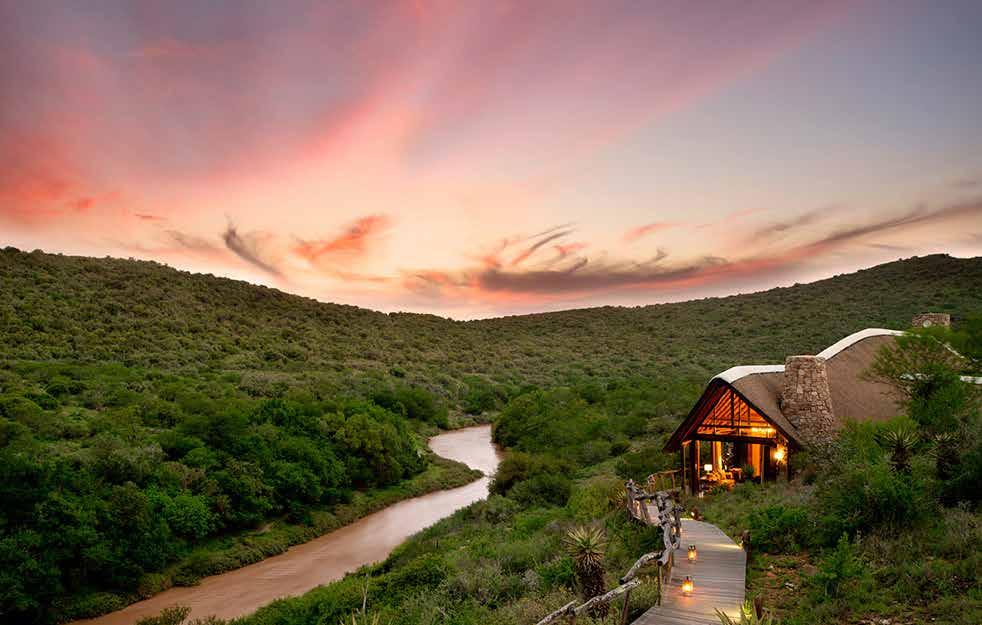
Kwandwe Private Game Reserve
Where to meet… The East London International Convention Centre is part of the Marine Park Complex on the East London Esplanade and is an ideal venue that is central and fit for purpose for exhibitions, gala banquets, cocktails functions, conventions, conferences, seminars and launches. Its dedicated team can assist organisers with innovative ideas for their next event and, should you need accommodation, the 260-room Premier Hotel EL ICC, as well as the adjacent 175 rooms of the Premier Hotel Regent, provide a range of options. What to see… The official Garden Route starts in Mossel Bay in the Western Cape and extends to Storms River in the Eastern Cape. Dotted with wine farms and quaint towns, the 300 km Garden Route is renowned for its glorious sightseeing opportunities by travellers to South Africa and locals alike. There is plenty of accommodation along this stretch but plan in advance so you don’t end up stranded. What to do… The Addo Elephant National Park is the third largest of South Africa’s 20 national parks. It is home to the densest elephant population in South Africa, with roughly 550 elephants – up from just 16 in 1989! The Addo Elephant National Park is an hour’s drive from Port Elizabeth and is in a malaria-free area. Where to stay… Kwandwe Private Game Reserve is a 22 000 hectare private game reserve, north of Grahamstown. Meaning ‘place of the blue crane’ in isiXhosa, the reserve is divided almost exactly in half by the Great Fish River. Spot the big five in this game reserve and choose from the different lodge and villa accommodation options offered by the venue.
WESTERN CAPE
Where to meet… There is an abundance of meeting and conferencing venues in and around the main city centre of Cape Town but the Cape Town International Convention Centre is by far the largest. For smaller conferences, the Century City Conference Centre provides beautifully lit spaces with fantastic layout options. And, conveniently, it is just across the road from the Century City Hotel, which has 125 rooms. What to see… With so much to explore in Cape Town, it is impossible to choose; however, one of its most famous attractions, Table Mountain, remains a firm favourite. No more is this apparent than during peak tourist season, when queues of cars can be seen wrapped around the hillside to try to get to the cable cars that transport excited passengers to the top. As it is one of the most popular spots in the region, consider going out of season if you don’t want a lengthy wait. What to do… From beaches and outdoor markets to museums and scenic vistas, there is a hive of activity taking place at any given time in the Western Cape. One of the best ways to see the province is with the Cape Town City Sightseeing Hop-On Hop-Off Tour. Depending on how much time you have to see the city, one- and two-day tickets across four different routes are available with audio guide headphones available for Afrikaans, Arabic, Chinese, Dutch, English, French, German, Italian, Japanese, Portuguese, Russian, Spanish, Swedish, Turkish and Zulu speakers. Where to stay… The Western Cape is one of the top travelled provinces in South Africa and offers a range of accommodation options – from bed and breakfasts to luxury, five-star hotels. For an incredible inner-city stay where guests’ every need is taken care of, the Taj Cape Town is not to be missed. Once home to the South African Reserve Bank, the Taj Cape Town has been refurbished with rich marble finishings, while retaining its old-school charm.
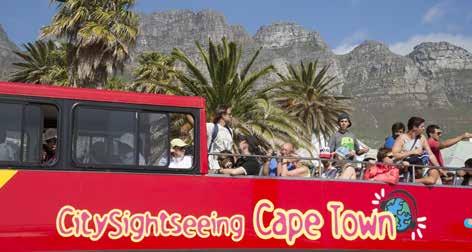


Century City Hotel
Meet The Premier Way

Premier Hotels and Resorts offers a wonderful collection, and new properties, in fantastic locations throughout South Africa - and is renowned for warm hospitality, excellent standards and kind staff. We welcome Mapungubwe, Quatermain, Falstaff and Roodevalley hotels to our family.
Book your conference at any Premier Hotel or Resort and be spoilt with special rates, great value-for-money and a customised menu of your favourite homemade meals to enjoy with lunch and tea/coffee breaks.



W W W. P R E M I E R H O T E L S . C O . Z A | 0 8 6 1 1 1 5 5 5 5 | I N F O @ P R E M I E R H O T E L S . C O . Z A WWW.FAIRCITY.CO.ZA | 010 001 9495
THE SOUTH AFRICA NATIONAL CONVENTION BUREAU, TOGETHER WITH THE CITY AND PROVINCIAL BUREAUX, OFFERS FIVE KEY SUPPORT SERVICES.
OVERVIEW OF THE SANCB’S KEY SUPPORT SERVICES:
1. Bidding support
In the Bidding Support phase, the SANCB can provide the following support:
• Pre- and post-bid support such as bid promotion and handling of requests for proposals
• Independent advice when selecting a destination for your event
• Bid materials to provide support to members
• Government Letters of Support
• Bid presentations
• Lobbying and promotional support
• Meeting planner support services, such as collateral materials, signage and assistance in locating suppliers
• Advice on local issues
• Destination expertise through numerous channels including the SANCB’s meeting and incentive planner website, and meeting planner fact books
• Co-ordinating requests for bidding
2. Site inspection support
Site inspections showcase the elements included in the destination’s bid. Site inspections are part of the SANCB’s service offering. The SANCB, in conjunction with the city and provincial convention bureaux, organises and facilitates site inspections to assist association heads and business-event decision makers by introducing them to the event professionals, who will bring their meeting, conference, event or incentive to life. The SANCB will invite key decision makers to view options to help confirm the conference offering, including pre- and postshow opportunities. Site inspections are a crucial part of the decision-making process for business events. The venue must be conveniently situated close to transport routes and important amenities and must boast the facilities and luxuries that befit a business traveller and conference delegate. The venue must be secure and attractive, with state-of-the-art infrastructure and technology, as well as excellent cuisine and a wide range of culinary and beverage options. Site inspections also reinforce the benefits of hosting a conference in South Africa and dispel negative preconceived notions.
The benefits are:
• South Africa is a cost-effective destination with attractive exchange rates
• South Africa is a world-class destination
• Delivery of world-class services and experiences that are on time and bring the WOW factor
• South Africa is a secure and harmonious nation
• The opportunity to leave a lasting impression
• Political/economic stability
• South Africans are warm, welcoming and professional. Furthermore, well-coordinated site inspections give decision makers key insights into the wide variety of venues available in the chosen city. This allows decision makers to make their choices based on the facilities and location that best suits the conference attendees
For destination expertise and convention planning support, contact the South Africa National Convention Bureau. T: +27 (0)11 895 3000 E: convention@southafrica.net W: www.businessevents.southafrica.net
3. Convention planning support
The South Africa National Convention Bureau, with the city and provincial bureaux, is perfectly positioned to assist with planning a congress, meeting, expo or convention in South Africa. Their team has effective working relationships with an extensive database of local service providers. The SANCB can also facilitate collateral materials, government liaison and advice on destination and local issues. Key services during the Convention Planning stage:
a) Sourcing Venues
South Africa has a wide variety of business event venues that cater for different types of events. The SANCB understands that no two events are the same, so they will tailor-make a list of recommended venues according to the specific needs of the event. Whether it’s a conference for 2 000 in one of South Africa’s Centres of Excellence, or a convention for 15 000 in the heart of Cape Town, Durban or Johannesburg, the SANCB will find the perfect venue. b) Locating Suppliers
A well-planned conference requires the co-ordinated efforts of numerous suppliers, such as stand designers and builders, catering companies, entertainment, translation services, professional speakers, security, transport, graphic designers, décor experts, audiovisual experts and many other technical suppliers. The SANCB works with city and provincial convention bureaux to propose recommended suppliers and facilitate business relationships. submitting requests for proposals in-house, and carefully monitoring their progress.
e) Co-ordinating Site Inspections
Site inspections are an integral aspect of the planning phase as they inform decision makers on the locations and facilities that will work best for the conference. The SANCB works closely with South Africa’s venues and is ideally positioned to facilitate the inspection of suitable locations.
c) Compiling Cost Estimates
Conferences require complex budgets that must be strictly adhered to. The SANCB understands the importance of these budgets, and will propose Professional Conference Organisers that can assist with budget-related matters. South Africa has dozens of excellent (PCOs) that are skilled in all aspects of conference organising, including costings and budgets.
d) Submitting and Monitoring RFPs

The SANCB and the relevant local convention bureau will ease the planning process by f) Advising on Pre- and Post-Tour Opportunities
South Africa has an abundance of pre- and post-tour opportunities. Conference delegates will be able to see for themselves why millions of travellers flock to South Africa every year. From wine-tasting along the world’s longest wine route, to exploring Gauteng’s cultural precincts, to visiting the country’s renowned Kruger National Park; the SANCB can advise the organising committee on the most rewarding destinations and activities to consider for their delegates.
4. Delegate boosting 5. On-site event services 4. Delegate boosting 5. On-site event services
The South Africa National Convention Bureau can co-ordinate efforts to increase the number of delegates attending a business event in partnership with the association. It is in the best interest of all involved to have the maximum number of delegates attend an event, which In turn boosts the success of the event. The SANCB can assist associations to promote and market a convention in a number of key ways, including promotional material, special services and cultural displays. The South Africa National Convention Bureau can co-ordinate efforts to increase the number of delegates attending a business event in partnership with the association. It is in the best interest of all involved to have the maximum number of delegates attend an event, which In turn boosts the success of the event. The SANCB can assist associations to promote and market a convention in a number of key ways, including promotional material, special services and cultural displays.
The SANCB offers three packages to assist with delegate boosting: The SANCB offers three packages to assist with delegate boosting:
• The Standard Package • The Standard Package
• The Elite Package • The Elite Package The evaluation criteria for choosing one of these packages includes: The evaluation criteria for choosing one of these packages includes:
• Being part of an international association agenda • Being part of an international association agenda
• Support provided in the bidding phase • Support provided in the bidding phase
• Delegate numbers (and the countries they are from) • Delegate numbers (and the countries they are from)
• Seasonality • Seasonality
• Duration • Duration
• Economic development criteria • Economic development criteria
The Delegate Boosting packages include a range of offerings, including tourism information giveaways, branding, electronic and print marketing material, destination marketing material, and (in the Elite Package), VIP gifting, wine and drinks activations and customised marketing materials. The Delegate Boosting packages include a range of offerings, including tourism information giveaways, branding, electronic and print marketing material, destination marketing material, and (in the Elite Package), VIP gifting, wine and drinks activations and customised marketing materials.
“We have to make sure that all delegates have a fantastic time in our country. This will ensure that they tell their friends and families, which translates to further business.” “We have to make sure that all delegates have a fantastic time in our country. This will ensure that they tell their friends and families, which translates to further business.”

Amanda Kotze-Nhlapo, Chief Convention Bureau Officer at the South Africa National Convention Bureau Amanda Kotze-Nhlapo, Chief Convention Bureau Officer at the South Africa National Convention Bureau
On-site event services are vital as they add remarkable value to a delegate, especially if the delegate is visiting South Africa for the first time. On-site services are the little things that can happen on site that make a big difference to the delegate’s experience. The SANCB is proud to offer on-site event services as part of its range of support services. The objective of this service offering is to enhance the delegate’s experiences and put into perspective the value of the delegate’s visit to our country, over and above the value of the conference programme itself. On-site event services are vital as they add remarkable value to a delegate, especially if the delegate is visiting South Africa for the first time. On-site services are the little things that can happen on site that make a big difference to the delegate’s experience. The SANCB is proud to offer on-site event services as part of its range of support services. The objective of this service offering is to enhance the delegate’s experiences and put into perspective the value of the delegate’s visit to our country, over and above the value of the conference programme itself.
WHAT ARE ON-SITE EVENT SERVICES? WHAT ARE ON-SITE EVENT SERVICES?
Some examples include; Some examples include;
• Cultural entertainment • Cultural entertainment
• Welcome stands and airport transfers • Welcome stands and airport transfers
• Acivity/local attraction bookings • Acivity/local attraction bookings
• Travel arrangements and activities for accompanying persons • Travel arrangements and activities for accompanying persons
• Personalised gifts • Personalised gifts
SANCB VALUE PROPOSITION
BIDDING SUPPORT
• Bid Strategy
• Bid Document
• Lobbying
• Bid Promotion
• Bid Presentations
SANCB SUPPORT SERVICES
SITE INSPECTION SUPPORT
• Bidding Site Inspections
• Convention Planning Site Inspections
PLANNING SUPPORT Planning support enue and supplie recommendations Final decision with CONVENTION PLANNING SUPPORT • Planning Support • Venue and Supplier Recommendations Final decision with client DELEGATE BOOSTING SUPPORT
• Marketing support to promote the SA conference
• Delegate attendance promotion ON-SITE SERVICES
• Support toward on-site elements of the event
ORGANISER / KEY DECISION-MAKER FOCUSED DELEGATE / CONSUMER FOCUSED
UNPACKING THE LEGACY OF BUSINESS EVENTS
Our value proposition as an industry has been changing from one based on delegate and organiser spending to the value of what these events actually achieve for organisers, participants and host communities. As simple as it sounds, this in fact has huge implications, because it places the business-events industry at the centre of both the global economy and the underlying scientific, professional, academic, business and social advancements that drive it.
THE IMPORTANCE OF BUREAU-LED RESEARCH
The outputs and legacies to be identified and quantified in the SANCB-led studies will cover a broad spectrum, from the value of networks and business transactions arising from an event, to medical advancements like improved disease awareness, research, and treatment practices. Also to be explored are the benefits that hosting events can deliver to the host community, including profiling a particular country or city in connection with key elements of their economic or social agenda or attracting new talent to key sectors. To learn more, contact the South Africa National Convention Bureau, and visit www.businessevents.southafrica.net
For destination expertise and convention planning support, contact the South Africa National Convention Bureau. T: +27 (0)11 895 3000 E: convention@southafrica.net W: www.businessevents.southafrica.net
LIFE IN THE HOSPITALITY LANE
Arnold Tanzer, Hostex 2020 ambassador and owner of Food on the Move, shares insights from his 31-year career in hospitality, with lessons learned along the way to inspire and guide young chefs of today.
Istarted my career in hospitality because I was hungry. I was in the Netherlands in 1989 escaping military duty in South Africa and the only job I could get was as a kitchen porter – a fancy word for dishwasher. I was given some sexy rubber boots, an apron, and pointed in the direction of the pot wash.
That was where my foray into cooking began. I helped with the unpopular jobs such as peeling onions and dicing potatoes and was soon moved within the company to a fine-dining restaurant as a demi chef and placed in an apprentice system. Three years later, I wrote my final exam and qualified.
I then spread my wings and joined Holland America Cruise Lines as chef tournant, which meant relief cheffing on any of the ships where there was a need, which was how I became Michael Douglas’s personal chef while he was shooting a movie.
FINAL TIPS
• Put your head down and graft • Be curious • Be strong – acknowledge your weaknesses, you can overcome them • Be patient – with yourself, others and your career path • Phone your mother often
I returned to South Africa and became head chef at Londolozi, which was a Relais & Chateaux property, and then travelled across the continent, training local chefs at the expanding group’s new properties.
In the early 2000s, I was owner of a delicatessen – a café and purveyor of fine locally produced food in Johannesburg – and I became involved in the SA Chefs Association, on the board as a director and for eight years as vicepresident. In my early 30s, I was elected to the WorldChefs board, still to date the youngestever elected director. The deli was followed by Food on the Move, which started about 18 years ago as a consultancy, evolved into a bespoke catering company, and is now firmly entrenched in the film and TV industry.

LIFE LESSONS My school years. I had no interest in the dogmatic, overbearing government school system, and I didn’t excel academically. I learned to knuckle down and get through phases in life that you don’t enjoy – they will pass – and to stand up for my beliefs and rage against the ‘machine’. My pot wash year. Any work is better than no work, and any opportunity offered must be grabbed with both hands. It has become the way I live – listen to the opportunity, if it suits you, go for it. Also, the scullery is still where you will find me if I am super-stressed and need to be on my own for a while. The work is mind-clearing. The ships. Glamour is an illusion and it takes a well-oiled, disciplined ‘army’ of hard-working people to create the comfort that people pay for. My time across Africa. The continent is full of opportunities and beautiful, smiling people who are keen to learn, contribute and live a meaningful life. No business can operate without buy-in from the community. The delicatessen. Retail is probably the toughest sector of our economy. As a small businessowner, the competition is fierce, you’re always on the back foot, you’re required to sacrifice a lot, from personal time to hard-earned cash, and the public can be ruthless in their judgement and expectations.

DELECTABLE DELIGHTS D o you want to prevent ‘presenteeism’ – being present, but lacking energy, focus, memory and productivity – in your meeting and conference attendees?” asks Mari Pronk, a registered dietician and ADSA (Association for Dietetics in South Africa) spokesperson.
Awareness about how food affects us, both immediately and in the long term, is driving smarter food choices worldwide. Events are no different, and careful menu design presents an opportunity not only to satisfy your guests’ taste buds and fulfill their varied dietary needs, but also to help them get the most out of your event – whether they are there to present, learn, network or sell. GASTRONOMIC GUIDELINES There is a lot to consider, but Pronk suggests the following guidelines will put you on the right track: Always establish whether any attendees have specific dietary needs before your event, so that you can cater for them. It is usually best to order halaal and kosher meals from an appropriate certified caterer. The basic healthy eating guidelines will apply to your menu – this will include lowering the intake of sugar, fat and salt and increasing the intake of dietary fibre and whole grains.
Avoid high-fat, starchy foods like vetkoek/fat cakes, croissants, pastries and samoosas.
Avoid large, heavy meals during lunchtime, as these can lead to drowsiness, seeing that more oxygen is pumped to the stomach instead of the brain.
Platters are a great option for in-between meals that can be served at tea breaks, or as lunch during half-day meetings.
Variety is key. For example, platters can consist of a mixture of fruits, vegetables, sandwiches, meats, and boiled eggs or cheese. Meat options include grilled chicken, mini skewers of beef or chicken, and mini meatballs. Vegetable options include crudités (cut vegetables such as celery, carrot, cucumber, peppers and cherry tomatoes) served with a tzatziki or hummus dip. Fruit options include pineapple slices, pawpaw, watermelon, sweetmelon, strawberries, small bunches of grapes and fruit kebabs. Serve sandwiches made with an assortment of whole-grain breads (whole wheat, seed, rye, brown), pita, buns/rolls and wraps. Fillings for these can include a protein such as tuna, egg, chicken or cheese, with salad vegetables like tomato, lettuce and cucumber. Small bran muffins are also a good choice. Lunch meals should have at least one lean meat dish option and one vegetarian option, one starch option and two vegetables options. Pronk recommends that you serve one dark green and one yellow/orange flesh vegetable/salad, because they contain a good mix of important vitamins. Serve low-fat salad dressings with salads. Vegetarian dishes can include vegetable and bean stew, vegetable curry, ratatouille with chick peas, vegetable lasagne or vegetable biryani. KEEPING HYDRATED Lastly, Pronk adds that hydration is often overlooked but critical in preventing fatigue. She suggests you serve jugs of water or bottled still water as the main beverage, and offer tea, coffee and rooibos tea as an alternative. Don’t forget to provide low-fat or fat-free milk, as well as sugar and sugar substitutes for tea or coffee. Finally, because of its high sugar content, offer 100% fruit/vegetable juice in portions of 250 ml or less. Food is key at events and here’s how you can keep your attendees awake, writes Pippa Naude.
HEALTHY EVENT EATING FOR FOODIE FANATICS Catering for healthy eating at events doesn’t have to be boring. Meetings looks at some of the ways you can ensure attendees eat well and feel good.
FUNKY FRUIT DISPLAYS
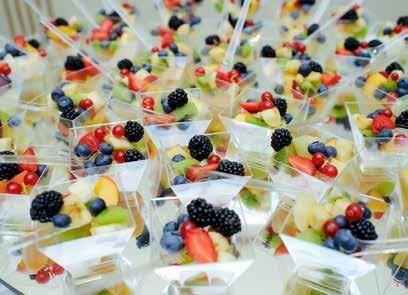
This is growing in popularity, with many events opting to have bowls of fruit as part of the snacks that are available to guests in conferences and seminars – fruit and veg displays are a fun and attractive way to entice guests to eat more nutritiously. Remember, it’s all in the presentation. SUSHI-ME
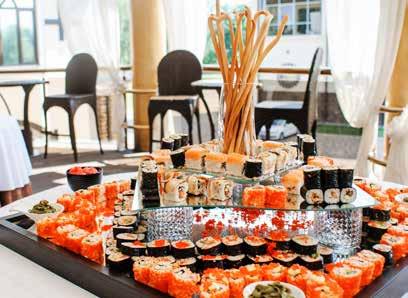
Sushi is still a massively popular catering item at events and, while the rice may be quite stodgy, there are varieties that won’t leave guests feeling overly full and unable to focus. Sushi is also all about aesthetics and can be arranged in beautiful and colourful displays.
DIY
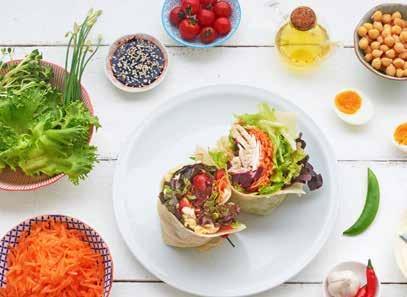
Let guests put together their own combinations with a lowGI/gluten-free noodle or wrap station that can be accompanied by a range of vegetables such as avocados, carrots, radishes, onions and fresh herbs like basil, as well as pine nuts and other tree nuts.
FUSS-FREE

Treat guests to a bit of everything with a range of healthy, smaller meals such as fish and tasty curries and bite-sized portions that they can easily eat standing and socialising without getting their hands dirty.
BEAT THE BUN

Heavy carbs are becoming increasingly phased out from menus for being just that – they’re heavy and delegates generally feel sleepy and lose concentration after a carb-laden meal, so combat this by turning to healthier alternatives such as veggie platters and portobello mushroom steak burgers.
SWEET TREAT

Avoid sugary and pastry desserts if you can help it and explore other options such as sorbets, frozen yoghurts and dark chocolate as alternatives. With a fruit salad as another option, this should provide guests with enough of a variety for a healthy pudding.


